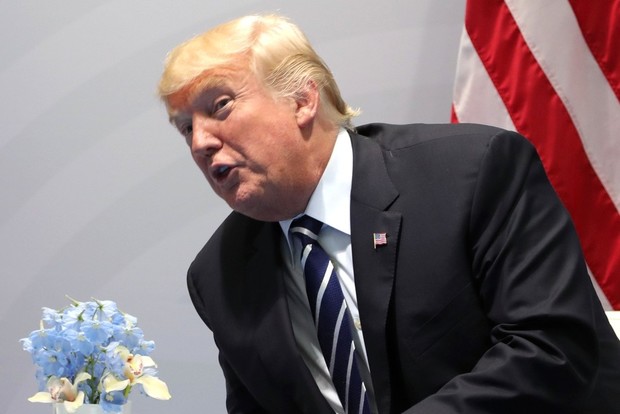''Memes are more interesting than real politics, which is boring, horrible and inhuman''
Well-known linguist Maksim Krongauz tells about speech portraits of politicians and memes in political speeches
Many people still remember how in June the public, including bloggers and journalists, reacted strongly to the typo of Donald Trump ''covfefe''. According to a linguist Maksim Krongauz, this reaction is a manifestation of the era of memes, in which we are living today, when the real politics is ''not only boring and horrible, but also inhuman''. About how in Russia the dialogue between the government and the society is developing, and why is it pointless to discuss degradation and death of the Russian language – read in the interview of Realnoe Vremya with the Professor.
Literature is not even a source of popular expressions today
Mr Krongauz, when we agreed on the interview, you said you are tired of endless talks about the death of the Russian language, about norms, borrowings. It turns out that it has already been said a lot, but it does not solve the existing problems?
A lot has been said about this, and most importantly, the discussion in the media and the Internet is going around in a circle. But at the same time, one cannot say that it does not affect the situation. A constant discussion in some degree shapes public opinion about the status of the Russian language. It is just not interesting for me to say the same things all over again.
If to summarize all these discussions, what is the current state of the Russian language?
Starting from the 1990s, there has been the discussion that in the Russian language there are a lot of borrowings, common parlance, swearings, jargon. As for the state of the language, then to put it in a nutshell, the language in adapting to the environment. Since the conditions of communication change, so does the language. Many people are unhappy about this, but it is a natural process.

''The influence of literature on large masses has fallen sharply. New words and expressions that appear from time to time and that are included in the Russian language are associated not with literary processes but with advertisements, vivid expressions of a blogger, politics have also become sources of such expressions.'' Photo: all.culture.ru
So you do not raise the alarm?
It is pointless to do. The Russian language does cope with its problems. Many languages are being in a more difficult situation. In this sense, it is quite all right with the Russian language. As for the influence of the English language, almost all big languages are experiencing it. We are living in the conditions of globalisation, the world is changing, and if a language continues to exist, if it is used in communication, including in business, sports fields, if it is used on the Internet, then it inevitably changes. If we write text messages in Russia we tune the Russian language to this communication environment, and because we are limited in the amount of words, that is why compression, words' reduction take place. It is a natural process of language adjustment to new communication conditions. Languages that change survive in these conditions.
How do modern poetry and prose in Russian, experiment of writers influence the state of the Russian language?
I think there is no influence. Literature today is not even a source of popular expressions, what used to be during several decades and even hundreds of years. Classic works included in school curricula used to be a source of aphorisms. Today memes are the heirs of aphorisms. Even modern cinema, at least in Russian, rarely becomes a source of such expressions. If literature gives new words, they belong only to the author. The influence of literature on large masses has fallen sharply. New words and expressions that appear from time to time and that are included in the Russian language are associated not with literary processes but with advertisements, vivid expressions of a blogger, politics have also become sources of such lines.
''Putin often uses the technique of lowering the speech''
It's hard to disagree when one sees how violently the public reacts to such a seemingly minor incident, such as a typo (covfefe), which Trump made. Where is such linguistic sensitivity appeared from? It seems that people today care more about discussion of this than some real gestures and actions of politicians.
It is not sensitivity and not even a reaction to the incident with the language. This is a reaction to the actions and words of Trump. We are living in the age of memes, and Trump is a kind of generator of memes, which are closely watched by the world of journalists and bloggers. It's really more interesting than real politics, which is not only boring and horrible, but also inhuman in the sense that there are no real people. So it is more pleasant to observe gestures and words of real people, creating a kind of political folklore with real characters, with an uncle president and a lady chancellor.

''We are living in the age of memes, and Trump is a kind of generator of memes, which are closely watched by the world of journalists and bloggers. It's really more interesting than real politics, which is not only boring and horrible, but also inhuman in the sense that there are no real people.'' Photo: kremlin.ru
What is the political folklore in Russia today?
If to speak about speech portraits, I can name a few people who have such portraits. It is, of course, Putin, Zhirinovsky. Politicians whose phrases are discussed, remembered and remain in the folklore. Among deceased politicians, I would call Chernomyrdin. People remember not those who speak correctly but those who say vivid phrases, changing style of speech while speaking without preparation. This is true, in particular, for Putin. He often uses the technique of lowering the speech, he inserts something dramatically rude. If in normal neutral speech, we suddenly say something out of the ordinary, something stylistically different, it's memorable. This vivid lowering creates an image of so to say a political macho, and that is attractive to many people. Even those who criticize it (e.g., the intelligentsia), they still remember it. The situation is the same with Trump. He is mostly associated with memes that hardly characterize him well. But most importantly, he is being discussed. It is another question whether it is good or not.
It is bad when people tell obscene words, but the government should not prohibit it
Recently, you have expressed doubts about the ability of the government to determine a language policy, when it was reported about intention of the authorities to standardise the rules of the Russian language. But in the Soviet times the government controlled the language policy, why is it impossible today?
Language policy and standardization of norms are very different things. Language policy of the state is very important, but at greater extent for the numerous languages of Russia, especially under threat of extinction.
For the state language it should be clearly defined the scope of its use. It is done not in the best way in the law on the state language. For example, the advertising, which is always characterized by linguistic experimentation, hardly needs to get into this field. Interestingly, in the Soviet Union, the Russian language legally was not a state language, but this did not prevent it actually to be so.
The discussion about ''standardization'' of the language, raised recently, I believe to be insignificant and politicized. First, the term itself is not clear, linguists usually speak of codification, and it takes place all the time. Constant appeals to the authorities to protect the Russian language create a false impression about the state of the Russian language, involve populist politicians in the discussion about language. Hence there is this crazy rhetoric about the degradation and death of the Russian language. Of course, ''lament for the Russian language'' for politicians is more attractive than hard work on dictionaries and grammars. Intervention of government in these processes are not needed at all and should be limited to rare occasions. They include the reform of graphics and spelling that took place in 1917-1918. It also may include regulation of the use of obscene words in the public space, what is taking place today. But having fascinated by this process, deputies want to ban swear words in a private space, which is ridiculous not even because it is almost impossible to prove, but also because the state should not regulate the speech of people in a private space.
Is it possible not in private space? For example, on the Internet?
As for the Internet, we don't always understand what is before us — a private or public space. It seems to me that modern legislators do not adequately take into account this point. For example, a discussion that often takes place in the comments under a message — can it be considered a public space or not, especially if one sets some limitations on the publicity (for example, communication between friends in social networks)?
''Intervention of government in these processes are not needed at all and should be limited to rare occasions. They include the reform of graphics and spelling that took place in 1917-1918. It also may include regulation of the use of obscene words in the public space, what is taking place today.'' Photo: wikipedia.org
Therefore, obvious is the need for definition of the publicity in the modern world. This applies not only to the Internet. Now obscene language is prohibited in the public space, there is a fine for it. But the law does not strictly define what the public space is. Of course, it is not only the space of street or square, not only the space of some gatherings. I would say that any professional communication can be called public. For example, communication between a police officer and an ordinary person. In this situation, neither police officer nor citizen can use the obscene language. Communication between a doctor and a patient — in this situation, there should not be obscene language, too. It is reasonable to define more strictly the notion of public space. But to control the private space — what is said between friends and relatives — the task is meaningless and hopeless. Of course, it is no good when one swears at home, but the state should not interfere in private space. To restrict the thought and the words that people say in private is impossible, even if it's bad thoughts and bad words.
To be continued